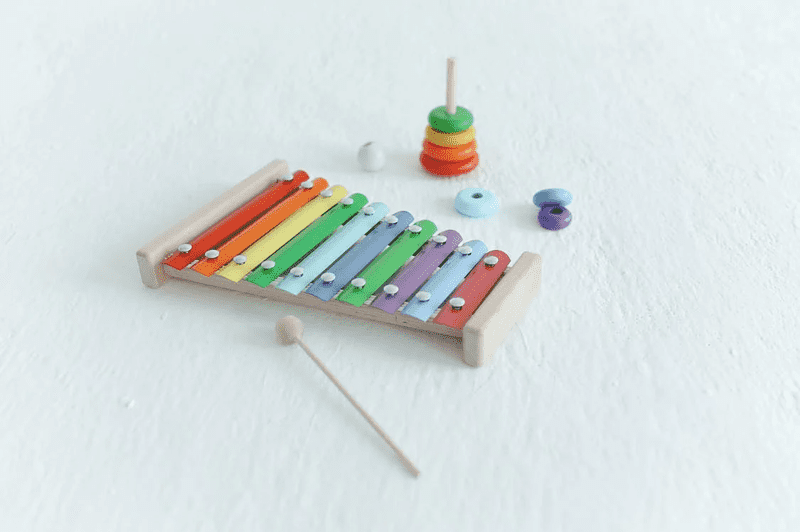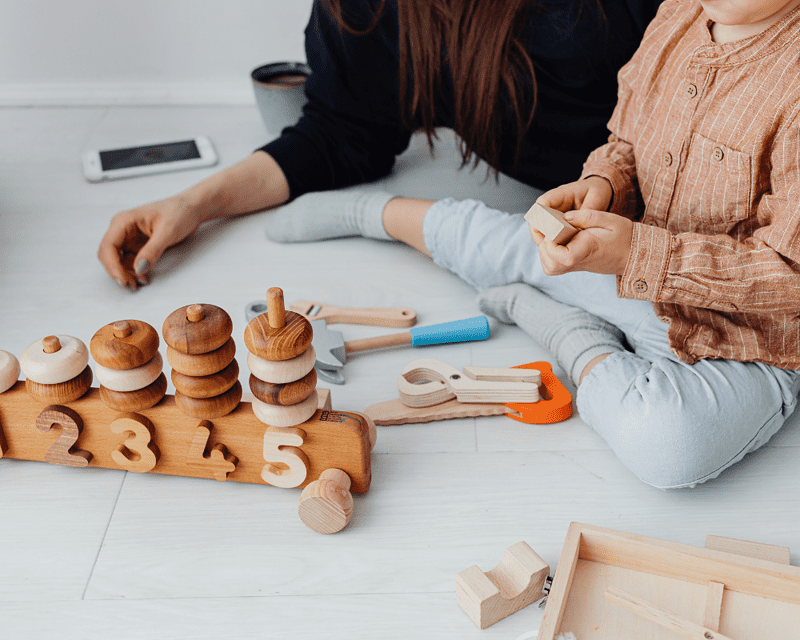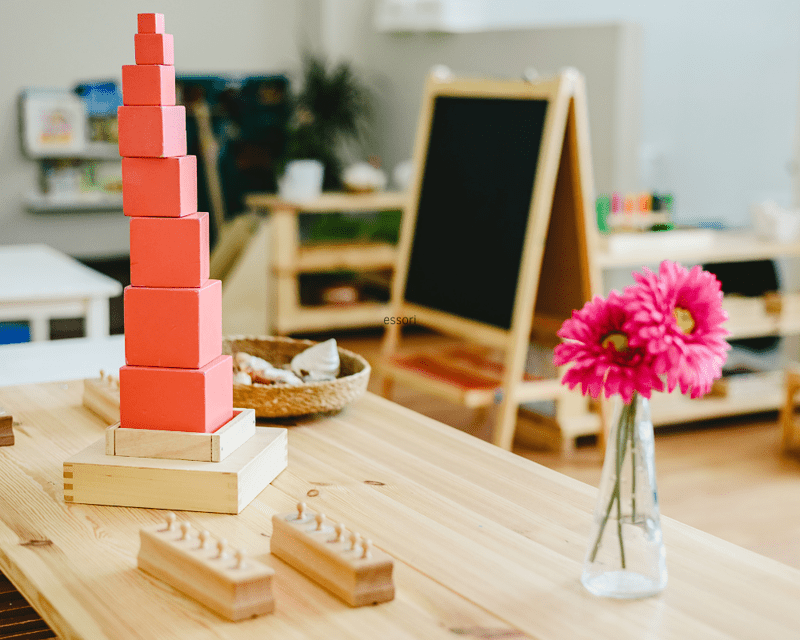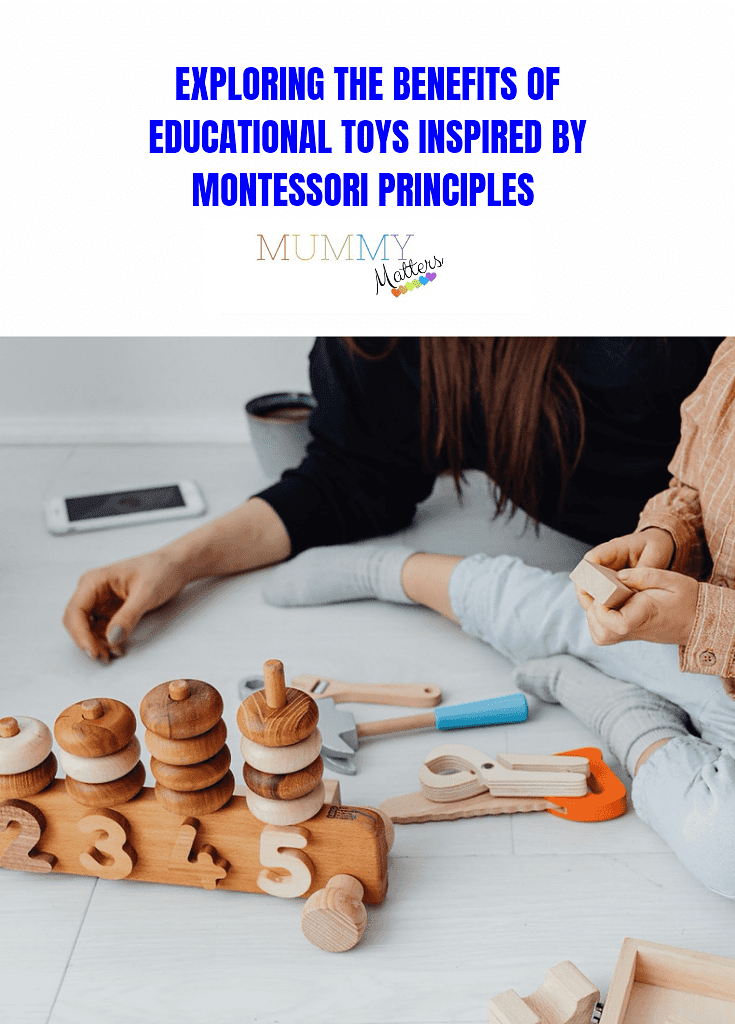As parents and educators, we always look for tools to help our children grow and develop into well-rounded individuals. We want them to be curious, creative, independent thinkers who love learning new things.
That’s where educational toys inspired by Montessori principles come in! These specially designed materials provide hours of fun and cultivate essential skills such as problem-solving, critical thinking, spatial awareness, and fine motor development.
If you aren’t familiar with Maria Montessori’s revolutionary approach to education, don’t worry – you’re in good hands here. As a Montessori expert/writer, I’ve spent years researching this innovative method that fosters a child-led environment where kids learn at their own pace and are encouraged to explore their interests freely.
In this article, we’ll dive deep into how these unique educational toys can benefit your child’s growth while keeping them engaged and entertained. So please sit back, relax, and let’s embark on an exciting journey of discovery together!
The Montessori Philosophy: A Brief Overview

Did you know that Montessori education is implemented in over 22,000 schools across 110 countries worldwide? This impressive statistic highlights the impact and effectiveness of the Montessori philosophy on modern education.
Developed by Dr. Maria Montessori in the early 20th century, this educational approach centres around creating an environment where children can actively engage with their surroundings to learn at their own pace and develop a sense of independence.
Montessori principles encourage hands-on learning experiences tailored to each child’s needs and interests. The prepared environment, one of its key components, provides a variety of materials and activities designed to stimulate curiosity, creativity, and critical thinking skills in children.
These materials often self-correct, allowing students to identify errors without adult intervention and fostering a growth mindset from an early age. As such, children who experience Montessori education tend to be confident learners capable of making independent choices about their educational journey.
One crucial aspect of the Montessori method is promoting autonomy and responsibility among young learners. Students gain essential skills for success inside and outside the classroom through carefully crafted tasks like practical life exercises or sensorial exploration using various manipulatives.
By nurturing these abilities early, we set our children up for long-lasting academic achievement and personal fulfilment. Building on this foundation paves the way for exploring how educational toys inspired by Montessori principles further support independent learning endeavours among youngsters today.
Encouraging Independent Learning
Having delved into the Montessori philosophy and its emphasis on fostering a child’s natural curiosity, we now shift our focus to one of the core tenets of this educational approach: encouraging independent learning.
By providing children with an environment rich in opportunities for exploration and self-discovery, educators can help them develop crucial skills that will serve them well throughout their lives.
Educational toys inspired by Montessori principles play a vital role in establishing such an environment. They support children’s innate desire to learn at their own pace.
Montessori-inspired educational toys provide numerous benefits when it comes to nurturing a child’s sense of independence:
- Hands-on experience: These toys often feature tactile materials and manipulatives that invite children to engage in concrete experiences, which helps them develop a deeper understanding of abstract concepts.
- Self-correcting design: Many Montessori toys incorporate built-in feedback mechanisms that allow children to check their work independently without relying on adult intervention or approval.
- Open-ended play: The versatile nature of these toys encourages imaginative play and experimentation, enabling children to explore multiple solutions and possibilities without being limited by predetermined outcomes.
One key aspect of promoting independent learning through Montessori-inspired educational toys is allowing children ample time for uninterrupted concentration. This fosters what Dr Maria Montessori called ‘normalization,’ wherein students become deeply engaged in purposeful activity, leading to inner calmness, orderliness, and personal growth.
When allowed to immerse themselves in meaningful tasks using thoughtfully-designed materials fully, children acquire valuable knowledge and cultivate essential life skills such as resilience, adaptability, and perseverance.
As we continue exploring how Montessori-inspired educational toys can benefit today’s learners, let us focus on another integral component: developing problem-solving and critical thinking abilities.
Developing Problem-Solving And Critical Thinking Skills
Developing problem-solving and critical thinking skills through Montessori-inspired educational toys is like planting a seed in fertile soil, nurturing it with care, and watching it grow into a strong tree. These essential life skills are the roots that support children’s intellectual growth and adaptability throughout their lives.
As an expert in Montessori education principles, I can attest to how these carefully designed toys stimulate young minds to think critically, analyze situations, and develop creative solutions. Montessori-inspired educational toys often present unique challenges for children to overcome using their cognitive abilities. They encourage children to observe, question, hypothesize, experiment, and reflect on their experiences.
This inquiry process lays the foundation for scientific thinking while fostering independent thought and self-confidence.
Children develop resilience by engaging in such activities from a young age as they learn that it is okay to make mistakes or fail. What matters most is perseverance and learning from those experiences.
One cannot overstate the value of cultivating problem-solving and critical-thinking skills early in life. Children who possess these skills tend to excel academically and socially as they easily navigate various aspects of life. Moreover, it prepares them for future endeavours where they must confidently tackle complex problems.
As our world continues to evolve rapidly due to technological advancements, there has never been a more crucial time for parents and educators alike to invest in building these foundational capabilities among our youth. With this understanding firmly rooted within us, let us delve deeper into another significant benefit of Montessori-inspired educational toys: enhancing fine motor skills and coordination.
Enhancing Fine Motor Skills And Coordination

As we’ve seen, Montessori-inspired educational toys can greatly contribute to developing problem-solving and critical-thinking skills. Another significant advantage lies in their ability to enhance children’s fine motor skills and coordination. Fine motor skills involve using small muscles, like those found in our hands and fingers, while coordination refers to how well these muscles work together with other body systems, such as vision.
Montessori toys are designed to promote dexterity by offering various activities requiring different precision and control levels. Some examples include:
- Sorting games: Children practice grasping objects and placing them into corresponding containers based on attributes such as shape or colour.
- Beading activities: Stringing beads onto a string helps develop hand-eye coordination and refine pincer grip—the essential skill for holding a pencil.
- Puzzles: Interlocking puzzle pieces challenge not only cognitive abilities but also necessitate precise hand movements and spatial awareness.
The beauty of Montessori-inspired playthings is that they naturally encourage repetition, which allows children to refine their techniques over time through trial-and-error learning experiences without becoming bored or frustrated easily. By providing diverse opportunities for engaging with materials that demand accuracy, patience, persistence, and self-correction—children gradually become more adept at controlling their bodies’ minute actions with greater intent.
This mastery forms the foundation upon which many future endeavours will depend, from writing legibly to playing musical instruments or even performing intricate surgical procedures.
As children advance in their exploration of Montessori-inspired educational toys designed explicitly for enhancing fine motor skills and coordination, they simultaneously foster creativity and imagination—nurturing an innate curiosity about the world around them while preparing them for success in all aspects of life.
In the next section, we’ll delve deeper into how these innovative playthings unlock creative potential within young minds while inspiring a lifelong love of discovery.
Fostering Creativity And Imagination
One of the most significant advantages of educational toys inspired by Montessori principles is their ability to foster creativity and imagination in children.
As a Montessori education expert, I can attest to the essential role that imaginative play has in child development.
When children engage with open-ended materials such as wooden blocks, puzzles, or art supplies, they are presented with infinite possibilities for exploration, problem-solving, and self-expression.
In a Montessori environment, we encourage children to explore their interests without limitations imposed by structured activities or adult-led instruction. This freedom allows them to experiment with different ideas and methods while nurturing their innate curiosity and creative abilities.
Educational toys designed according to Montessori principles often lack specific instructions or predefined ways to use them; instead, they invite children to think independently and find new approaches through trial and error. Such experiences help develop resilience, resourcefulness, and adaptability – vital skills needed for success in today’s complex world.
The importance of fostering creativity cannot be overstated: research has shown that individuals who exhibit high levels of creativity tend to have better problem-solving skills, increased emotional intelligence, and enhanced cognitive flexibility.
By providing our children with opportunities for creative expression from an early age through Montessori-inspired educational toys like building sets, sensory bins, or arts & crafts kits, we are paving the way toward a lifetime of personal growth and fulfilment.
Now let us examine how these wonderful resources also promote spatial awareness, which plays a crucial role in cognitive development.
Promoting Spatial Awareness And Cognitive Development
A significant benefit of Montessori-inspired educational toys is promoting children’s spatial awareness and cognitive development. Spatial awareness refers to an individual’s understanding of their position within a given space and the relationships between objects or people within that environment. This aspect of cognition plays a crucial role in physical activities such as sports and dance and problem-solving, mathematics, and even social interactions.
By exposing children to various materials and opportunities for exploration, these toys can help them develop essential skills like hand-eye coordination, balance, depth perception, and mental visualization. Montessori principles emphasize the importance of hands-on learning experiences where children are encouraged to explore and manipulate objects independently.
In this context, some exemplary educational toys include:
- Puzzles: These offer unique challenges that require critical thinking, pattern recognition, and perseverance.
- Building blocks foster creativity while enhancing fine motor skills and three-dimensional reasoning abilities.
- Geometric shapes sorter: Kids learn about shape identification and classification by sorting different geometric shapes into corresponding holes on a puzzle board or container.
- Tangram sets: Composed of seven flat pieces called ‘tans,’ tangrams encourage kids to create varying designs by rearranging these elements according to specific patterns or instructions.
These Montessori-inspired toys allow children to experiment with various arrangements while refining their spatial senses through trial-and-error processes. As they make mistakes and readjust their strategies accordingly, they become more adept at organizing information effectively – which ultimately translates into improved academic performance across diverse disciplines.
Indeed, fostering spatial awareness and cognitive development should be a priority when considering educational tools for young learners. Montessori-inspired toys provide ample opportunities for growth in these areas without compromising on fun or engagement levels.
With so many benefits tied to their use – including enhanced creativity, stronger problem-solving capacities, and better teamwork skills – it is no wonder that parents continue turning towards such products as valuable resources in their child’s early learning journey. The next phase involves understanding how to choose the most suitable Montessori-inspired toys for your little one and ensuring they reach their full potential.
Choosing The Right Montessori-Inspired Toys For Your Child

Having explored the numerous advantages of Montessori-inspired toys in promoting spatial awareness and cognitive development, it is crucial to identify which toys best suit your child. With countless options available today, making an informed decision can be challenging.
As a parent or caregiver looking to adopt Montessori principles into your child’s playtime, consider the following factors when selecting appropriate educational toys.
Firstly, recognize your child’s individual interests and developmental stage. Each child grows at their own pace, and what may be engaging and beneficial for one might not hold for another. Observe how they interact with their environment – whether they gravitate towards building blocks, puzzles, or art materials – as this will help you choose relevant toys that foster a love of learning while addressing their unique needs. It is essential to provide them with opportunities to explore various areas of growth; therefore, incorporating diverse activities such as practical life skills exercises, sensorial exploration, or language enrichment tools would be highly recommended.
Another vital aspect to consider is the quality and design of the toy itself. Opt for materials made from natural elements like wood or fabric instead of plastic whenever possible. These eco-friendly choices contribute positively towards sensory experiences while emphasizing durability over time. Additionally, ensure each item is age-appropriate by checking labels and reading product descriptions thoroughly before purchasing. By doing so, you can prevent potential hazards related to choking or other accidents involving small parts unsuitable for younger children.
Armed with these insights into selecting Montessori-inspired toys tailored specifically for your child’s development journey, you’ll soon discover how seamlessly these resources enhance everyday play experiences.
Up next: uncover strategies for effectively integrating Montessori principles into daily routines beyond choosing suitable toys!
Integrating Montessori Principles Into Everyday Play And Learning
Integrating Montessori principles into everyday play and learning can be a natural and enjoyable process for children and adults. By incorporating these ideas, we foster the development of essential life skills such as independence, creativity, problem-solving abilities, and social interactions in our children. To begin this journey, it is important to understand that the primary focus of Montessori education is on creating an environment where each child feels safe, respected, and supported while being presented with opportunities to learn at their own pace.
To bring Montessori principles into everyday play experiences, consider offering open-ended materials that promote exploration and discovery. These are items without specific instructions or outcomes attached to them; instead, they encourage children to use their imagination and curiosity to engage with the objects in various ways. Examples include blocks, art supplies like paint or clay, nature-based items such as sticks or stones, loose parts like buttons or beads, and even household items like pots and pans.
When selecting toys for your home or classroom environment, opt for those made from natural materials whenever possible – not only do they provide beautiful tactile experiences, but they also help cultivate an appreciation for the world around us.
Parents or caregivers seeking to integrate Montessori-inspired practices into daily routines beyond playtime activities can look for other opportunities throughout the day to support autonomy-building experiences. This might involve allowing young children choices about what clothing they wear in the morning or encouraging older kids’ involvement in meal planning and preparation tasks. Remember that fostering independent thinking does not mean abandoning guidance altogether – rather than simply telling a child how something should be done step-by-step, offer gentle suggestions which allow space for their creative problem-solving approaches.
Conclusion
In conclusion, Montessori-inspired toys truly pave the way for a child’s holistic development. As parents and educators, it’s essential to recognize that children are like sponges – they absorb everything around them.
Providing them with educational toys based on Montessori principles encourages independence, creativity, and cognitive growth while nurturing their innate love of learning.
So go ahead and explore the world of Montessori-inspired toys! You’ll invest in your child’s future and foster a lifelong passion for knowledge and discovery.
Remember, Rome wasn’t built in a day; with patience and persistence, you can help shape your little one into an empowered learner who embraces challenges head-on.

